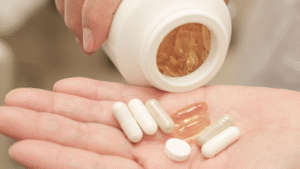Table of Contents
Finding Calorie Dense Foods During Hyperemesis Gravidarum
If you or someone you love is battling hyperemesis gravidarum (HG), you know how exhausting it can be to fight through constant nausea, vomiting, and extreme weight loss.
One partner recently shared online about how his wife lost over 15 pounds in her first trimester. She was surviving on a few slices of bread, some jam, and fruit popsicles because almost everything made her sick. He was desperate to find bland, high calorie foods that could help her regain strength.
For many women, this experience feels isolating and overwhelming. It isn’t just morning sickness. HG can lead to dehydration, malnutrition, and emotional strain for the whole family. If you’re struggling to get enough calories, you’re not alone—and there are ways to gently add more nutrition without worsening nausea.
Why Calorie Dense Foods Matter in HG
Because HG causes frequent vomiting, women can lose essential nutrients and rapidly burn through energy stores. Research shows that severe cases often lead to ketosis, where the body breaks down fat for fuel due to lack of calorie intake (Kahhale et al., 2023). This makes calorie dense, easy-to-digest foods a key part of recovery alongside medical care.
The goal isn’t to eat big meals. Instead, small, frequent snacks that are soft, bland, and easy to tolerate can make a big difference. Cold or room temperature foods may feel more soothing than hot meals.
Gentle, Calorie Dense Foods to Try
Women who have walked this path suggest focusing on simple carbohydrates that don’t have strong smells or flavors. Potatoes, rice, and bananas are often easier to handle than greasy or highly seasoned foods. Mashed potatoes with dairy-free butter or white rice with a sprinkle of salt can be comforting options.
Smoothies are another lifesaver. They provide calories, hydration, and can be tailored to individual tolerances. Adding peanut butter, almond butter, or lactose-free protein powder can boost both calories and protein.
According to Kahhale et al. (2023), calorie intake is a primary factor in preventing complications in HG, so blended foods can be an efficient way to meet energy needs when chewing feels impossible.
For some women, canned fruits in heavy syrup—like peaches or pears—are easier to tolerate and provide both calories and hydration. Popsicles, clear soups with soft rice or noodles, and dairy-free yogurt can also help keep calorie intake steady.

Helpful Supplements to Support Nutrition
When food alone isn’t enough, supplements can help fill in nutritional gaps. A gentle prenatal vitamin formulated for sensitive stomachs may provide essential nutrients without worsening nausea.
Look for a brand that uses methylated folate and is free of common allergens. A plant-based protein powder that is dairy-free and easy to blend into smoothies can also be a practical way to add calories without strong flavors.
If you’re considering supplements, always check with your healthcare provider first to ensure they are safe for your pregnancy and specific needs.
Practical Tips for Partners
Supporting a partner with HG can feel overwhelming, but small acts make a big difference. Preparing bland options in advance, keeping cold smoothies ready in the fridge, and stocking up on easy snacks like plain crackers, dairy-free yogurt, or canned fruit can help reduce stress.
It’s also important to celebrate small wins. Even a few extra bites of food or sips of a smoothie count as progress. Patience, empathy, and teamwork go a long way in navigating this difficult season.
A Word From Vitamins For Woman
Hyperemesis gravidarum is one of the toughest challenges some women face during pregnancy. It’s okay to feel frustrated or scared when eating feels impossible. Remember, every small step toward better nutrition is a victory.
If you’re exploring supplements to support your intake, consider looking into a gentle prenatal vitamin or a plant-based protein powder that can easily blend into smoothies. Always talk to your healthcare provider before starting anything new.
Above all, know that you’re not alone. With medical care, supportive nutrition, and time, many women with HG go on to have healthy pregnancies. Stay encouraged, and lean on your support system—you’re doing better than you think.
Kahhale, S., Zugaib, M., & Francisco, R. P. V. (2023). Hyperemesis gravidarum: Nutritional aspects and management. Nutrients, 15(15), 3300. https://doi.org/10.3390/nu15153300
Lowe, S. A., & Bowyer, L. (2020). Nutritional interventions for hyperemesis gravidarum. Scientific Reports, 10, 4497. https://doi.org/10.1038/s41598-020-61114-y












